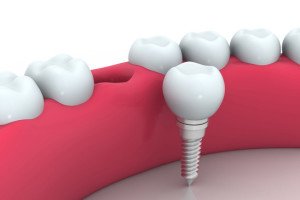 Dental implants are made of titanium and porcelain, neither of which can be affected by cavities. However, it’s very important to keep your gums healthy both before and after you receive implants. One of the most common causes of implant failure is gum disease, so healthy gums are a must if you have implants.
Dental implants are made of titanium and porcelain, neither of which can be affected by cavities. However, it’s very important to keep your gums healthy both before and after you receive implants. One of the most common causes of implant failure is gum disease, so healthy gums are a must if you have implants.
Dental implants, unlike your natural teeth, are not susceptible to decay. They’re made of metal and porcelain, so the bacteria that cause tooth decay can’t affect them. However, there are special considerations concerning implants when it comes to gum disease.
Gum disease is one of the leading causes of tooth loss when it comes to your natural teeth. In implant dentistry, gum disease is one of the leading causes of implant failure. When you develop gum disease, the gums pull back from the tooth roots, leaving the teeth with insufficient support. Eventually, the teeth can become loose and fall out. The same thing can happen with implants. If the gums become severely infected, they will no longer be able to support the implants, and the implants will become loose. Once an implant fails in this way, the only thing to do is to remove it and start again.
Because of the problems that can occur when you develop gum disease, many dentists ask implant patients to see them more often than just twice a year, particularly in the first year or two after the implant procedure. This is to ensure the gums remain healthy and the implants remain secure. If signs of gum disease occur, your dentist can treat them promptly and prevent eventual implant failure.
Implants can collect bacteria and plaque just like regular teeth, so it’s very important to brush regularly and floss around the abutments. If you have a removable denture anchored with implants, clean the denture regularly to remove any plaque or bacteria buildup. Taking good care of your implants will help ensure they last you a lifetime.
To ask more questions about the implant process, or to discuss your own implant options, contact our office today!